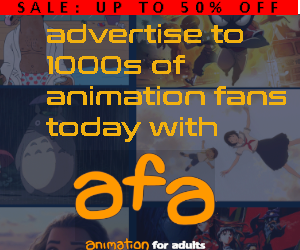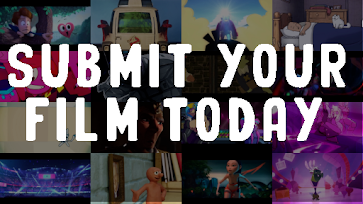Is Independent Animation on Youtube Doomed?
Does indie animation have a future on YouTube? Google's giant video-hosting platform is host to a great number of talented animators, from those backed by massive media organisations to dedicated individuals working out of their bedrooms. Some of the biggest animation channels have many multi-millions of views and millions of subscribers. The most successful of these have been able to sustain themselves on their channels alone, and dedicated themselves to animation full-time. But there have been rumblings of discontent for some time. Changes to YouTube behind the scenes have made it increasingly hard for animators to make money and it only seems to be getting worse. Recently the debate has really begun to pick up speed as a number of prominent YouTube animators have released videos tackling the subject. But how big a problem is it and just what can be done about it?
The subject really caught fire when Aussie animator Ross O'Donovan (aka Rubber Ninja) released a video -entitled Does Independent Animation Have a Future on YouTube?- that was subsequently picked up on by leading blog Cartoon Brew. O'Donovan lays out the issues that have been created by changes to the site's algorithms. In the past YT rewarded content producers based on views their videos racked up- the more hits your videos got the more money you were able to earn from advertising. Now, however, their emphasis has switched to what they call "View Time". Basically the longer a user spends watching videos on the site after watching yours (even if they then watch content from other users) the better your chances. They have also placed much more emphasis on longer videos and more frequent uploads.
This environment is simply not animator-friendly as animation is an incredibly labour-intensive and time-consuming process. It's simply not possible for individual animators- or even a small team- to produce high-quality material under these conditions. This set-up is extremely favourable to the more popular content on the platform- vlogging, beauty tips and videogames content for example. But the net result is it's extremely difficult for animators to thrive under this new system.
Worryingly, O'Donovan's fellow Aussie animator Sexual Lobster points out that in 2014 he can expect to make roughly half the revenue from a video than he would have done a few years ago. Other prominent animators have also weighed in including Rice Pirate Mick.
Just what can actually be done about this? Despite all its flaws, YouTube remains by far the biggest source for video online. In theory there's nowhere better for a content creator to find a potential audience. But if it's impossible for your audience to find you just what's the point? The algorithms also dictate where you show up in search results too, so it's not even just a problem of money any more.
AFA's web animation hero Jonti Picking (better known as Weebl) has been a prominent critic of YouTube's changes for some time via his presence on twitter. Frustratingly for creators, YouTube no longer publishes all new uploads to all your subscribers, making it harder for those like Weebl to stay in contact with his or her fanbase. These other changes have seemingly only added to his frustration.
Whether this is enough to make up for the shortfall in lost revenue is another matter. Many creators feel a little uncomfortable with this model, but often feel they are left with little option. There are other sources of revenue such as sponsorship, merchandise and commissions, but there's no simple quick-fix. YouTube is unlikely to switch back, there's simply too much money to be made from people talking over videogames in high-pitched voices, "unboxing" or putting on make-up. So in the end animators may need to look to alternative channels in order to keep doing what they love.
There's talk of alternative platforms or even collaborative animation sites, but in the short-term how can you as a fan support your favourite animators? Aside from financial supporting via sites such as Patreon, buying merchandise and even temporarily turning you ad-blocking software off can help. If you're unable to help monetarily, just helping to share their work really helps. Retweets, Facebook shares or Emails to friends really can help your animation heroes- and they will appreciate it more than you'll ever know.
The subject really caught fire when Aussie animator Ross O'Donovan (aka Rubber Ninja) released a video -entitled Does Independent Animation Have a Future on YouTube?- that was subsequently picked up on by leading blog Cartoon Brew. O'Donovan lays out the issues that have been created by changes to the site's algorithms. In the past YT rewarded content producers based on views their videos racked up- the more hits your videos got the more money you were able to earn from advertising. Now, however, their emphasis has switched to what they call "View Time". Basically the longer a user spends watching videos on the site after watching yours (even if they then watch content from other users) the better your chances. They have also placed much more emphasis on longer videos and more frequent uploads.
This environment is simply not animator-friendly as animation is an incredibly labour-intensive and time-consuming process. It's simply not possible for individual animators- or even a small team- to produce high-quality material under these conditions. This set-up is extremely favourable to the more popular content on the platform- vlogging, beauty tips and videogames content for example. But the net result is it's extremely difficult for animators to thrive under this new system.
Worryingly, O'Donovan's fellow Aussie animator Sexual Lobster points out that in 2014 he can expect to make roughly half the revenue from a video than he would have done a few years ago. Other prominent animators have also weighed in including Rice Pirate Mick.
Just what can actually be done about this? Despite all its flaws, YouTube remains by far the biggest source for video online. In theory there's nowhere better for a content creator to find a potential audience. But if it's impossible for your audience to find you just what's the point? The algorithms also dictate where you show up in search results too, so it's not even just a problem of money any more.
AFA's web animation hero Jonti Picking (better known as Weebl) has been a prominent critic of YouTube's changes for some time via his presence on twitter. Frustratingly for creators, YouTube no longer publishes all new uploads to all your subscribers, making it harder for those like Weebl to stay in contact with his or her fanbase. These other changes have seemingly only added to his frustration.
Remember when YouTube crippled a thriving animation community so people could spend longer watching stuff being removed from boxes? What fun
— Weeeeeeeebl (@TheWeebl) August 3, 2014
Which is why he (like numerous others) are turning to alternative sources of income like crowdfunding or Patreon. The latter allows fans to become patrons of their chosen artist, and directly fund their work. Weebl's Stuff offers Patreon backers the chance to see videos before everyone else, so his loyal fans are rewarded.Whether this is enough to make up for the shortfall in lost revenue is another matter. Many creators feel a little uncomfortable with this model, but often feel they are left with little option. There are other sources of revenue such as sponsorship, merchandise and commissions, but there's no simple quick-fix. YouTube is unlikely to switch back, there's simply too much money to be made from people talking over videogames in high-pitched voices, "unboxing" or putting on make-up. So in the end animators may need to look to alternative channels in order to keep doing what they love.
There's talk of alternative platforms or even collaborative animation sites, but in the short-term how can you as a fan support your favourite animators? Aside from financial supporting via sites such as Patreon, buying merchandise and even temporarily turning you ad-blocking software off can help. If you're unable to help monetarily, just helping to share their work really helps. Retweets, Facebook shares or Emails to friends really can help your animation heroes- and they will appreciate it more than you'll ever know.























